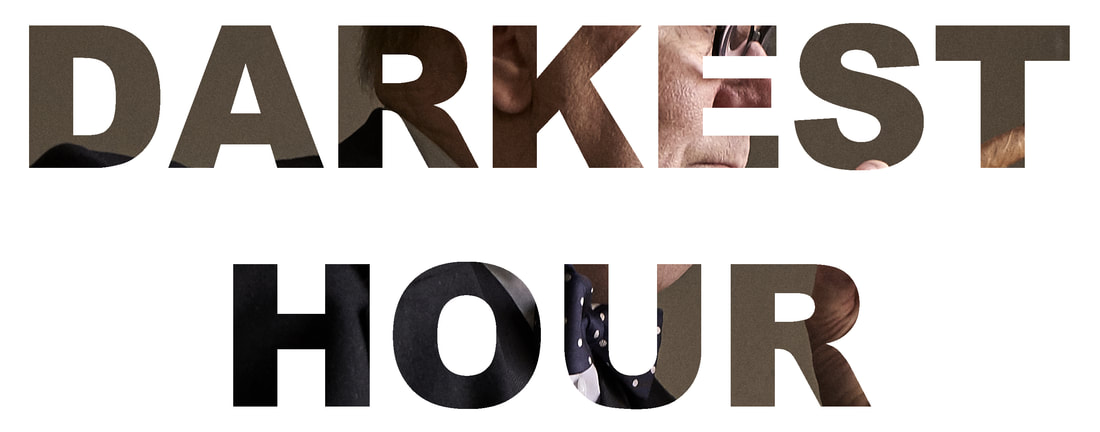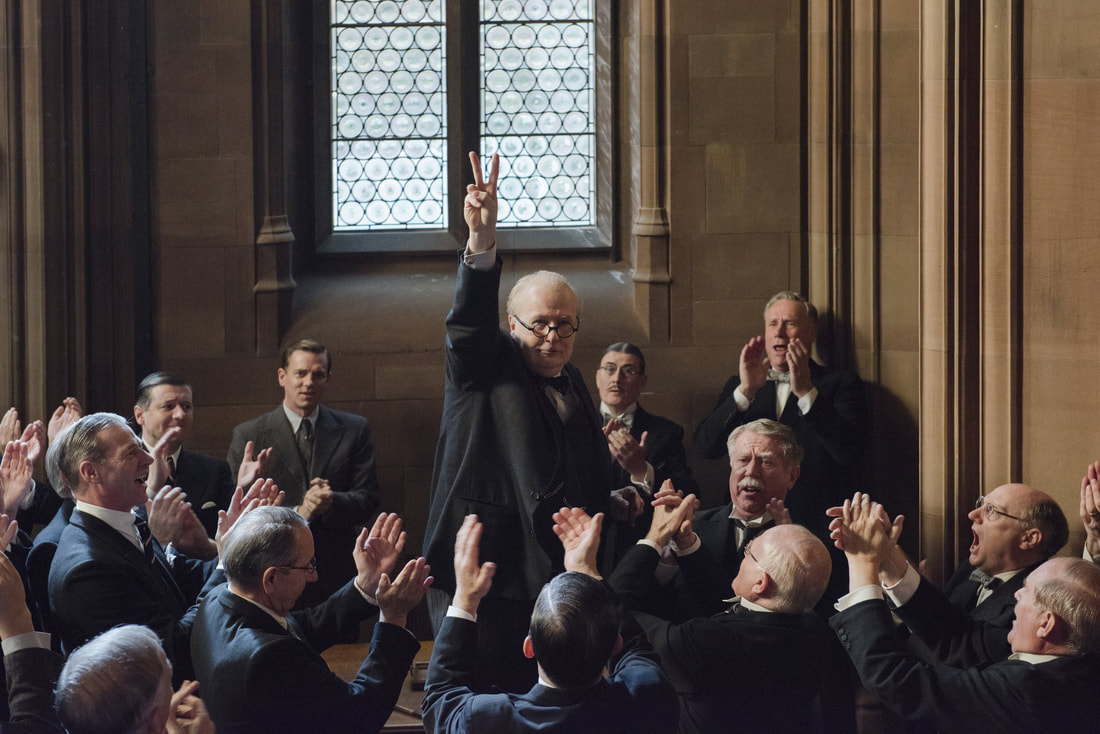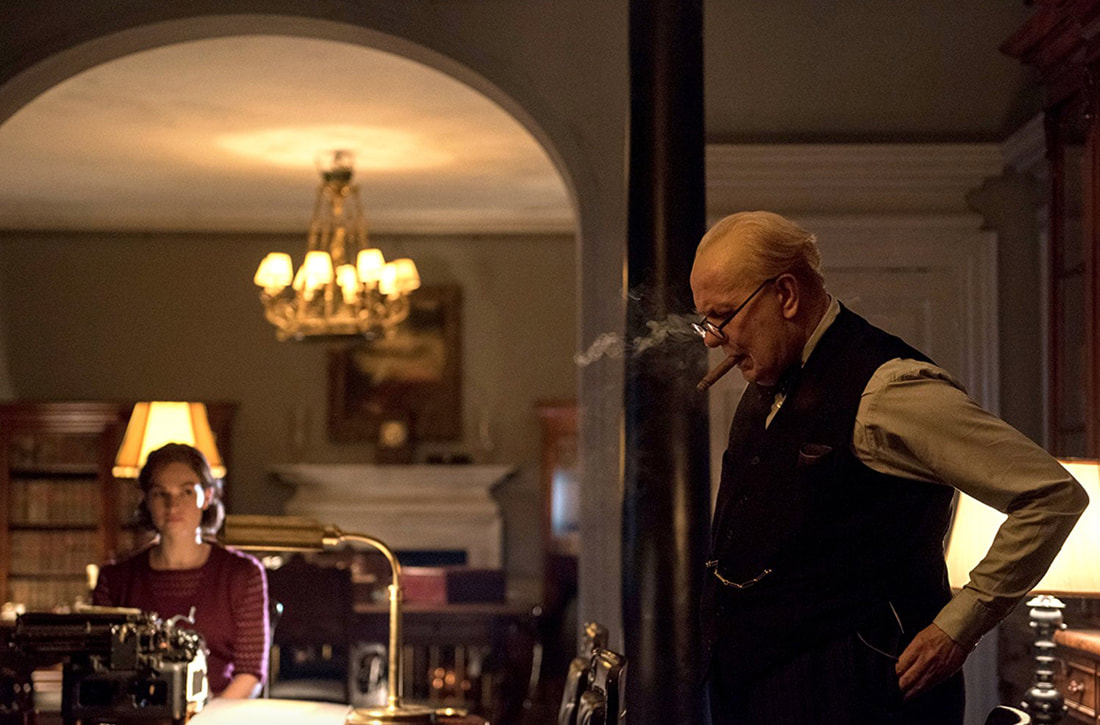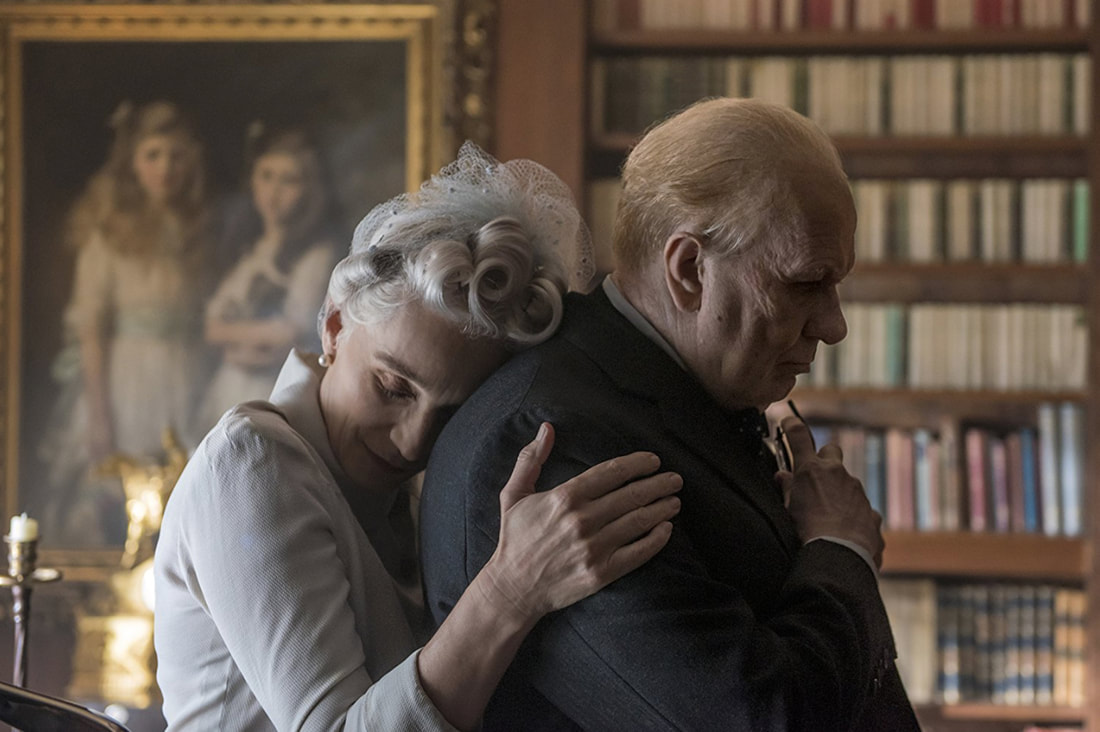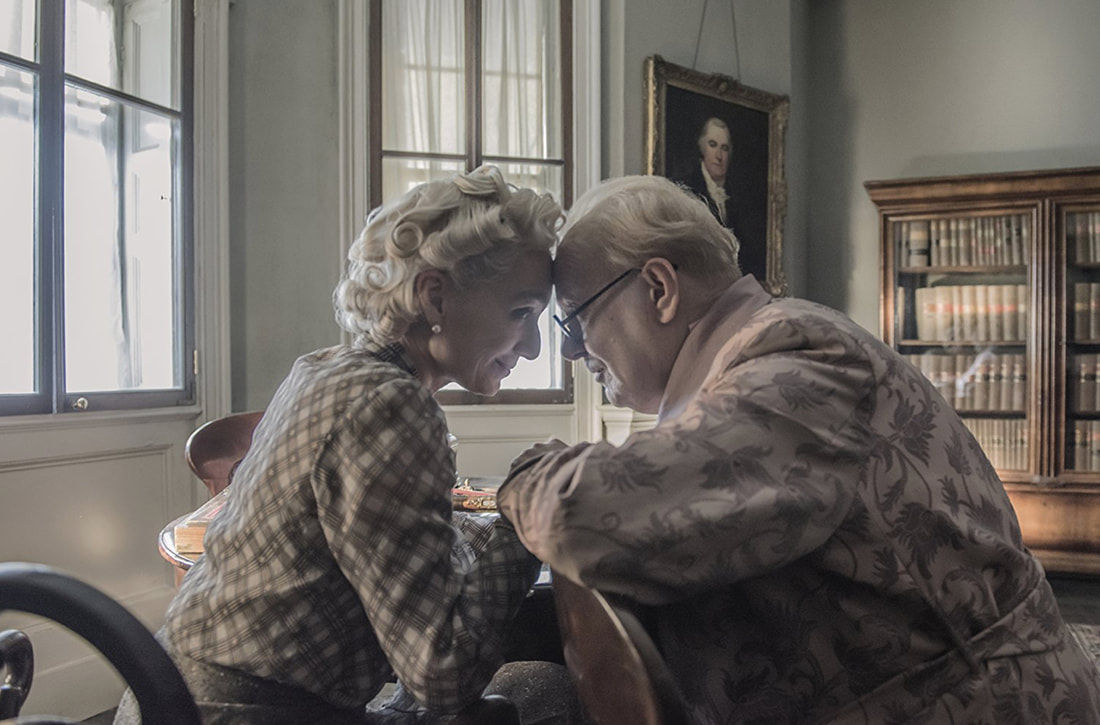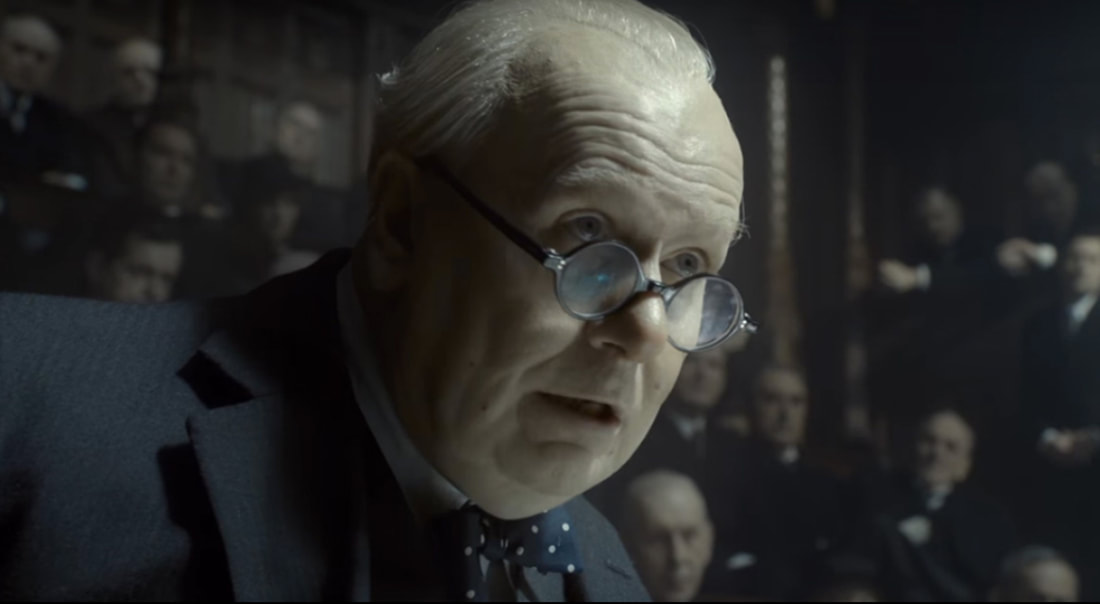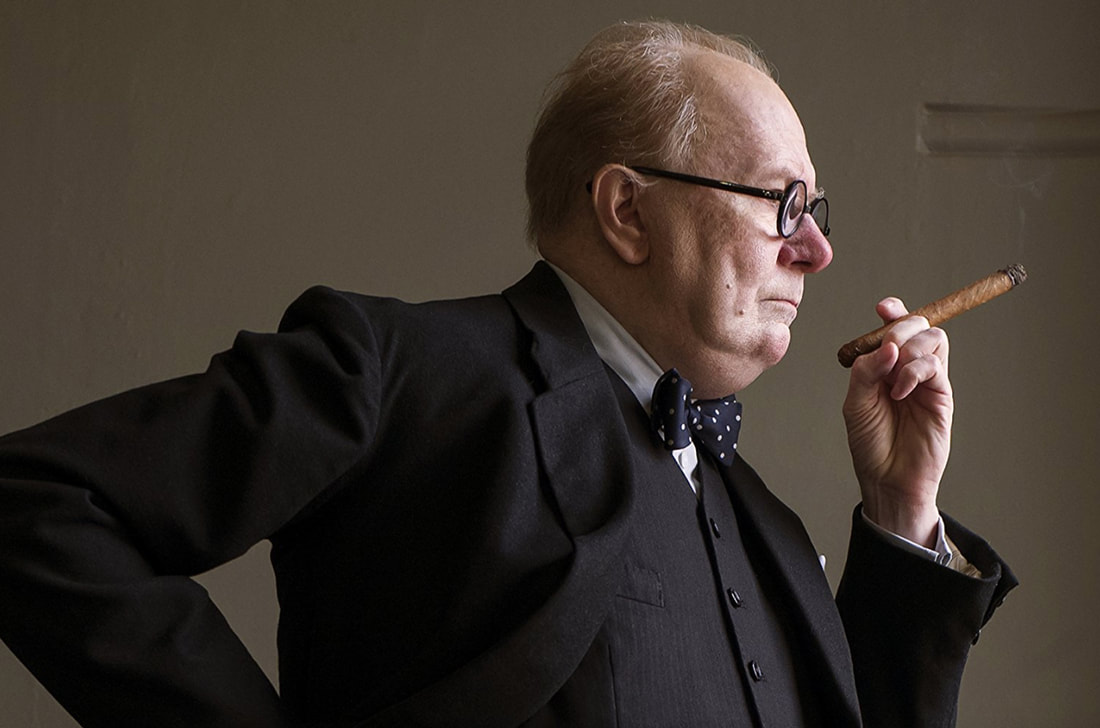|
★★★☆☆
4 October 2017
A movie review of DARKEST HOUR. |
“Which self should I be today?” Winston Churchill (Gary Oldman)
Why do all this year's plethora of Winston Churchill projects have to introduce him through the eyes of a secretary? The repeated narrative device is not a fascinating gender reversal. Meaty roles they aren't, with added gender stereotype propensity for tears. Kate Phillips as Venetia Scott in THE CROWN [season one], Ella Purnell as Helen Garrett in CHURCHILL, and now Lily James as Elizabeth Layton here. It is bizarre that three different creative teams have opted for such. So often in cinema and television the newbie character is the audience way into a story. They learn as we learn. It has become a lazy choice. Dropping the viewer into the thick of it is a sign filmmakers take us seriously.
Why do all this year's plethora of Winston Churchill projects have to introduce him through the eyes of a secretary? The repeated narrative device is not a fascinating gender reversal. Meaty roles they aren't, with added gender stereotype propensity for tears. Kate Phillips as Venetia Scott in THE CROWN [season one], Ella Purnell as Helen Garrett in CHURCHILL, and now Lily James as Elizabeth Layton here. It is bizarre that three different creative teams have opted for such. So often in cinema and television the newbie character is the audience way into a story. They learn as we learn. It has become a lazy choice. Dropping the viewer into the thick of it is a sign filmmakers take us seriously.
The main reason one likes DARKEST HOUR is how it portrays the UK Conservative party. If you think they are despicable now, what with austerity - dismantling the welfare state instead of punishing the bankers - wait till you see them here. 1940, Winston Churchill is shown to be the lone voice preventing his political party from capitulating and doing a deal with Hitler. Churchill is shown to grasp the madness and danger of the Nazis, and is unwilling to surrender. The film is as much about the Dunkirk escape, as it is about turning his own colleagues to his view.
May 9th 1940. Titles quickly establish the turmoil in the UK government. The Conservatives do not have a majority and are forced into a coalition. The policy of appeasement by Prime Minister Neville Chamberlain (Ronald Pickup) has sundered his credibility and he resigns. Opposition party, Labour, vetoes all his replacements bar Churchill. The cut and thrust of parliament fascinates, and unlikely would surprise the cynical. However, even the most jaded might still be shocked that there was not a forceful, almost united, agenda in defeating Hitler. But in the age of Brexit and Trump, immorality and cowardice is too often the default mode.
Gary Oldman’s make-up completely alters his appearance. Not for the first time. See his depraved Mason Verger in HANNIBAL. Though he does remind a little of Eddie Murphy in a fat suit. The jowls do look fake. Nice to see Oldman sink his teeth into a lead role again (you must watch TINKER TAILOR SOLDIER SPY) after acting in dross like THE HITMAN’S BODYGUARD, CRIMINAL and ROBOCOP.
Playing malevolent so well, Ben Mendelsohn as King George VI is unexpected casting. For my dislike of TV-movie-of-the-week THE KING’S SPEECH, it feels like Colin Firth created the definitive version (as with Daniel Day-Lewis’s Abraham Lincoln in LINCOLN). James Purefoy in CHURCHILL and Jared Harris in THE CROWN are more than fine, but feel like imitations. Mendelsohn interestingly portrays King George as also wanting to do a deal. Wasn’t it his older brother, and abdicator Edward VIII, the Nazi sympathiser of the family? The character about-face is so sudden as to ring false – whether it is or not.
“He mobilised the English language and sent it into battle,” Edward Halifax (Stephen Dillane). Some neat dialogue as one would hope for a Winston Churchill flick. The man however was massively flawed. VICEROY’S HOUSE showed a glimpse of that. DARKEST HOUR vaguely touches on his missteps. Another project should delve deeper when Britain was not at war.
Annoying narrative clichés crop up, and the film’s home straight ruins the solid work. Three speachifying scenes (such as Churchill interacting with the public on the underground) are overblown and cheesy. A shame, as so much of the film has compelling politicking. It is also unfortunate for Gary Oldman that his performance has come hot on the heels of an extraordinary turn by John Lithgow, in THE CROWN, who rightly won an Emmy.
Using these Google Adsense links help us keep Filmaluation free for all film and arts lovers.

